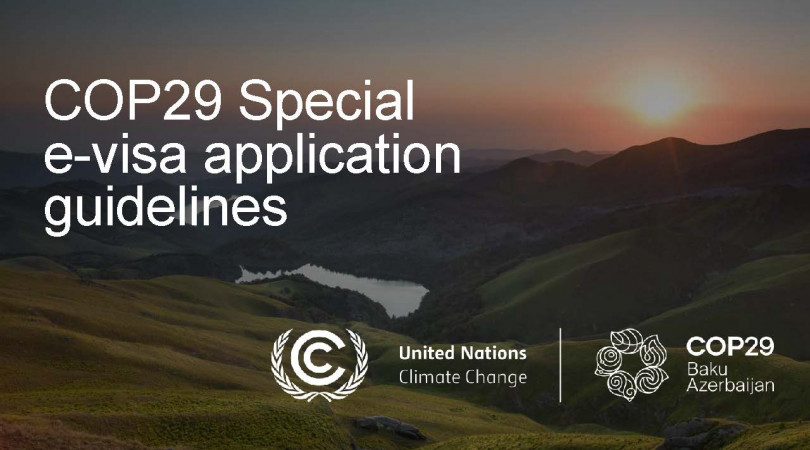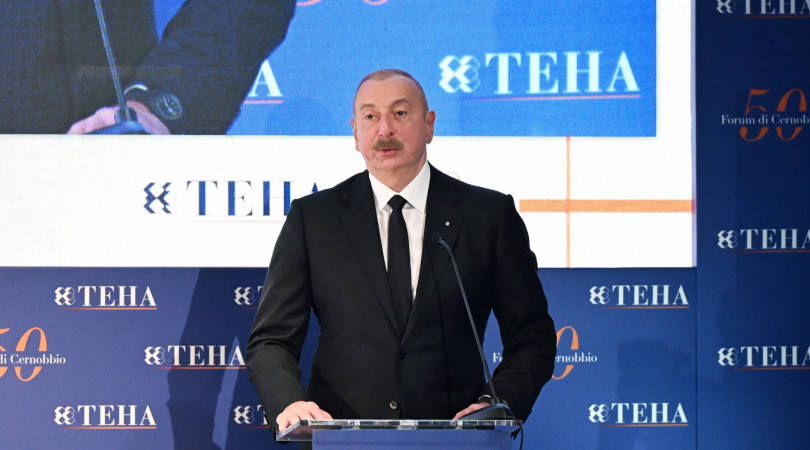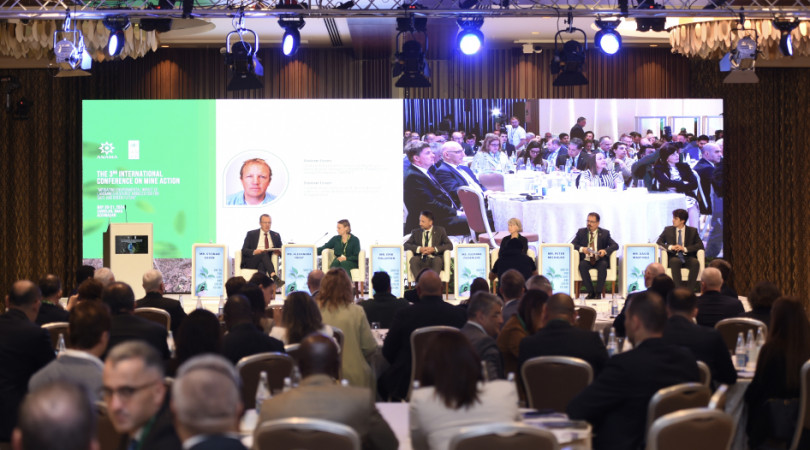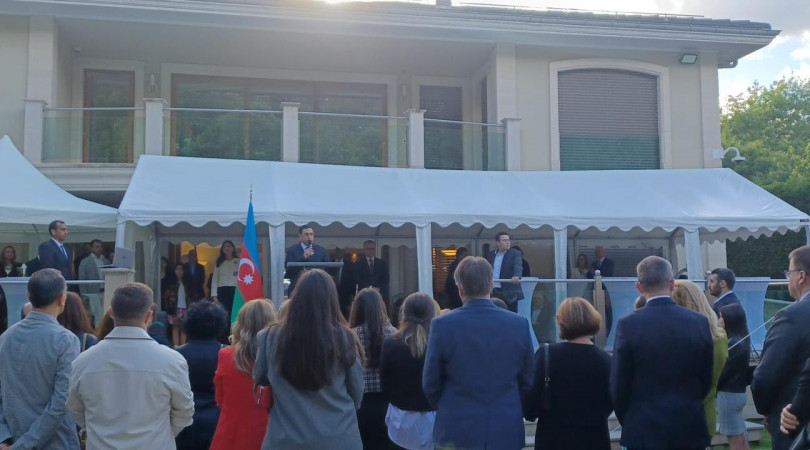Statement by Amb. Vaqif Sadiqov at the 3rd Annual Dialogue: Advancing Peace Through Interfaith Harmony, Geneva, 9 February 2018
Third Annual Interfaith Dialogue
Advancing Peace Through Interfaith Harmony
Presentation by Ambassador Vaqif Sadıqov
Permanent Representative of the Republic of Azerbaijan to the UN Office
and Other International Organizations in Geneva
9 February 2018, Palais des Nation, room XIV
Mr. Moderator,
Excellencies,
Ladies and gentlemen,
It is a great privilege for me to speak to this audience today on such an important topic of peace and interfaith harmony. I am grateful to distinguished Ambassador Saja Majali and UNITAR Programme Director Mr. Alex Mejia for inviting me to join this panel of eminent speakers.
Mr. Moderator,
The central issue of this dialogue could have never been so topical as today. We are living in a critical global context, marked by unprecedented threats to peace and security, requiring more effective synergy of the international community to minimize the dangers associated with wars and armed conflicts and their devastating consequences on societies, tense political conflicts and their implications on civil peace, wide-spread ethnic and religious conflicts undermining stability, unprecedented human population movements accompanied by acute humanitarian crises, the growing trends of hate and racism in many parts of the world, and the flagrant violations of international law resulting from bellicose arrogance by states. These are the direct consequences of a growing number of intra- and inter-state conflicts, with acts of ethnic and cultural cleansing fueled by radicalization and violent extremism exposing millions of men and women to immense suffering, with youth being the most affected.
The number of people displaced by conflicts and violence around the world is now estimated at 65 million – the highest figure since the Second World War. Around the world, some 130 million people are in humanitarian need. Climate change, population growth, and weak political and economic systems continue to put people at risk of natural and man-made hazards around the world. The solutions to these crises are neither simple nor quick.
The 2030 United Nations Agenda for Sustainable Development represents a new commitment to global action, inspired by the values and principles of the UN, and an integrated response to the cultural, social, economic and environmental challenges of today. The foundations of such an action have been laid by a number of important initiatives within the United Nations, of which the initiative put forward by H.M. King Abdullah II of Jordan at the UN General Assembly in 2010 is of a particular importance. This initiative later transformed into UNGA Resolution 65/5 unanimously adopted on 23 November 2010 which proclaimed the first week of February of every year the World Interfaith Harmony Week between all religions, faiths and beliefs. The Resolution also encouraged all UN Member States to support the spread of the message of interfaith harmony and goodwill in the world’s churches, mosques, synagogues, temples and other places of worship.
This is where notions of respect for diversities and sharing common values come into play. This is where the concept of multiculturalism becomes relevant and starts to matter.
One has to admit, that pessimistic thoughts related to multiculturalism are expressed these days in a number of countries, in particular in Europe. Some believe that multiculturalism has failed; others even think that this trend should not be allowed because it is “harmful”. But what are the alternatives to multiculturalism? It is obvious that the alternatives to multiculturalism are xenophobia, discrimination, racism, Islamophobia, anti-Semitism, which are extremely dangerous trends. In the context of a sweeping globalization people with different cultures, histories, religions and beliefs now come closer together. Politicians and scientists are talking about a “dialogue between civilizations”, but in reality we already see early manifestations of inter-civilizational clashes. Amidst these serious challenges to world peace and security it is the duty of intellectuals and opinion leaders to stand up for universal values and foster dialogue among cultures, civilizations and religions developing the habit of openly talking about the issues of concern. Therefore, these issues have to be on the top of political agendas of individual countries and of the UN.
My own country – Azerbaijan – is proud of its history and diverse culture rich of material and cultural monuments, literature, arts and music heritage. Located on the western shore of the Caspian Sea and bordered by Muslim Iran and Turkey, and Christian Armenia, Georgia and Russia, this country of ten million mostly Shia Muslims has developed a centuries-long tradition of acceptance of its numerous ethnic and religious minorities. One of the oldest mosques in the world – the Juma Mosque built in 743, is located in Azerbaijan, in the town of Şamaxı. At the same time, one of the oldest churches in the Caucasus – the Church of Kish (XII century), which was the Caucasian Albanian Apostolic church is near the Azerbaijani city of Şəki. There is also the Atəşqah Zoroastrian temple of fire worshipers built in the XVII century not far from Baku. The pieces of Azerbaijani arts created by skillful craftsmen of ancient Azerbaijani cities of Baku, Ganja, Nakhichevan, Tabriz, Şuşa, Gazakh, Quba, Şaki and Şamaxi can be found in museum collections of Victoria and Albert of London, Louvre of Paris, Metropolitan of Washington, museums of Vienna, Rome, Istanbul, Berlin, Tehran, Cairo, etc.
Throughout the history Azerbaijan, where the Azerbaijani Democratic Republic – the first secular democracy in the Muslim world – was established in 1918, has always been a multi-confessional and multi-ethnic country. Women in Azerbaijan were granted the right to vote as early as in 1918, thus making Azerbaijan the first Muslim country ever to enfranchise women.
Azerbaijan, located at the juncture of two continents – Europe and Asia, has established all necessary legislative conditions for representatives of various ethnic groups and confessions to exist freely, preserve their culture, traditions, religion and language. My country committed to its strategy of developing and strengthening the traditions of multiculturalism, which is the most important asset for peace, diversity, and harmony in the Azerbaijani society, regardless of political systems dominating in this country in different periods of its history. Azerbaijan has never had any confrontation or misunderstanding on religious or ethnic grounds, which is one of its greatest achievements. Development of multiculturalism and tolerance at the level of a state policy in Azerbaijan, which is a secular state, is based on ancient history of statehood of the country and on development of these traditions at present. Article 18 of the Constitution states that any religion in Azerbaijan acts separately from the government, each religion is equal before the law, and religious propaganda abating human dignity and contradicting principles of humanism is prohibited. Article 48 of the Constitution of Azerbaijan ensures the liberty of worship, to choose any faith, or to not practice any religion, and to express one’s view on the religion. The law of Azerbaijan of 1992 “On freedom of faith” ensures the right of any human being to determine and express his views on religion and to execute this right.
Today Azerbaijan acts as a model for peaceful coexistence of diverse cultures. Historical monuments of all religions – mosques, churches and synagogues, are protected by the state, which also provides funds for their restoration. Currently there are more than 650 registered religious communities in Azerbaijan, among which 37 are non-Islamic, and Azerbaijan has 13 functioning churches.
The building of the Russian Church of Jen Mironosets which was built by Azerbaijani oil industrialist Haji Zeynalabdin Tağiyev in 1907 was granted to the Russian Orthodox Church in 1991. Currently there are three Russian Orthodox Churches in Baku, one in Gəncə and one in Xaçmaz.
The catholic community was registered in Azerbaijan in 1999. According to the agreement between the Governments of Azerbaijan and the Holy See, following the visit of Pope John Paul II to Azerbaijan in May of 2002, the St. Mary’s Catholic Church of Baku was constructed in 2007 in Baku, after the older one was demolished in the period of the USSR 70 years ago. The new church was inaugurated by Vatican’s Secretary of State Cardinal Tarcisio Bertone on 7 March 2008. During the 2016 visit to Azerbaijan, Pope Francis held an interreligious meeting at the country’s largest mosque with Orthodox, Catholic, Muslim and Jewish confessional leaders.
It has been more than 2500 years since Jews settled in Azerbaijan. Currently 6 Jewish religious communities are registered here, and there are 7 synagogues functioning in Azerbaijan. There is also a Jewish school, the biggest in the Caucasus, which has been operating in Azerbaijan since 2003.
As a consequence of national consensus and public support to the ideology of multiculturalism, and material and financial assistance from local authorities, there are dozens of schools, cultural centers, theatres, associations, societies of many ethnic communities and groups living in Azerbaijan at present. The Azerbaijani authorities also support dozens of magazines, newspapers, radio and television programs in the languages of ethnic groups and minorities.
Azerbaijan contributes also to the preservation of cultural and religious heritage across the world. Restoration works of the Catacombs of Sts. Marcellino and Pietro (Rome, Italy), the Cathedral Church (Strasbourg, France), ancient masterpieces in the Museum of French History in Palace of Versailles (Paris, France), the Philosophers Room in the Capitoline Museum (Rome, Italy), the Louvre Museum (Paris, France), Trapezitsa Architectural Museum Reserve (Veliko Tarnovo, Bulgaria), etc. sponsored by the Heydar Aliyev Foundation which is headed by Mehriban Aliyeva, the First Lady of Azerbaijan, are important examples of this contribution.
The declaration of 2016 the Year of Multiculturalism in Azerbaijan took place against the backdrop of numerous religiously motivated ethnic conflicts in the Middle East. By developing its own brand of soft power, Azerbaijan promotes multiculturalism to be viewed as a model elsewhere, especially in the states and societies of the Middle East plagued by radicalism in recent decades.
With this in mind, the Baku International Multiculturalism Center was established in 2014 to introduce Azerbaijani model of multiculturalism to the world, and to carry out research of existing multicultural models. The Center’s branches have been established also in Bulgaria, Germany, Israel, Italy, Moldova, Portugal, Russia and the United States. One of the mainstream projects of the Centre is promoting a special university course of “Azerbaijani multiculturalism” at local and foreign universities. This course has already been incorporated into the teaching programs of some leading universities across Europe such as La Sapienza University in Rome, Charles University in Prague, Fribourg University in Switzerland, and in Russia, Georgia and Indonesia.
Another avenue for Azerbaijan to promote the ideas of multiculturalism is this country’s active cooperation with its partners through multilateral diplomacy. Azerbaijan is a member of both the Council of Europe (CoE) and the Organization of the Islamic Cooperation (OIC), and plays an active role in both organizations, which bring together more than 100 countries. In 2008, Azerbaijan initiated the establishment of relations between the CoE and the OIC by inviting ministers of culture of the OIC countries to the Baku forum of the ministers of culture of the CoE member states. That initiative was called the “Baku process”, which has become a platform that enables people worldwide to support intercultural dialogue and peace building enhancing cross cultural understanding for building strong societies. Furthermore, in 2009 Baku hosted the conference of the ministers of culture of the OIC and invited the ministers of culture from Europe to that event. Thus, a very important new process was launched by the initiative of Azerbaijan.
Countering the trends of religious, cultural and social intolerance and building solid platforms and opportunities for dialogue, intercultural competencies and cultural literacy lie in the heart of the Baku International Humanitarian Forums and World Forums on Intercultural Dialogue initiated in 2010 and 2011 respectively by the Government of Azerbaijan, offering new opportunities for articulating academic knowledge with policy-making. Key partners of Azerbaijan in these events are UNESCO, Islamic Educational, Scientific and Cultural Organization (ISESCO), UN Alliance of Civilizations (AoC) and CoE.
The Baku International Humanitarian Forums and World Forums on Intercultural Dialogue are the appropriate formula to materialize all humanitarian, cultural and creative efforts to achieve such lofty goals. Its participants are morally responsible, culturally committed and urgently required to make wise decisions and feasible recommendations for translating the innovative ideas they share in the Forums’ sessions into tangible practices to fulfill these humanitarian objectives, and contribute to warding off the dangers looming over the world. The last Baku International Humanitarian Forum held in Baku in 2016, has brought together over 400 representatives from almost 80 countries, including 13 Nobel Prize winners.
The Seventh Global Forum of the UN Alliance of Civilizations was held in Baku in 2016 with extensive discussions on international humanitarian cooperation, multiculturalism and other important issues. By using the UN platform, Azerbaijan has once again demonstrated its multiculturalism traditions, and urged the world community to fully respect principles of tolerance, intercultural and inter-civilizational dialogue.
In recent years, Azerbaijan has also played host to big sporting events. The first-ever European Games held in Baku in June of 2015 have been a symbolic indicator because the first European event of this kind was organized in a Muslim-majority country. In 2017, the 4th Islamic Solidarity Games will be held in Baku as well. Thus, one city at the crossroads of the East and West has hosted European and Islamic Games over the course of two years. This is the brand of a present-day Azerbaijan.
My country’s peculiar location between East and West with various ethnicities and religions living together in mutual respect has allowed adopting a multiculturalism-led agenda as a strategic tool of its foreign policy. Such a policy among other benefits allows the country to defend itself for decades from multifaceted manifestations of religious and political extremism, radicalism and exclusion. Today Azerbaijan represents a small country’s success story that could be viewed as a model, especially within a regional framework where radicalism has spread rapidly over the last 20 years. Azerbaijan, through its political vision based on its history, has managed to turn the people’s differences and diversity into an asset adding an extra value to the country and making it safe from triggers of extremism and threats of violence.
My country strongly believes that multiculturalism is the only viable option for the development of societies in the age of globalization, because the opposite – engaging in self-isolation – would be a disastrous trend. Fostering the necessary political and social conditions for acceptance and coexistence give the country a feeling of security and unity, making it more open to differences and diversity.



















